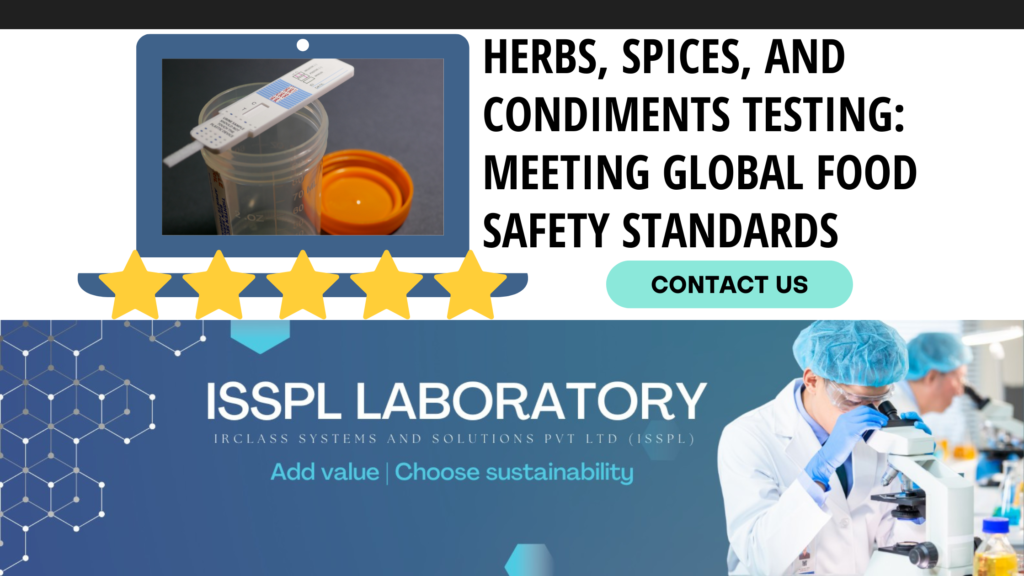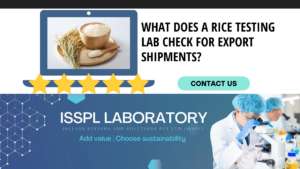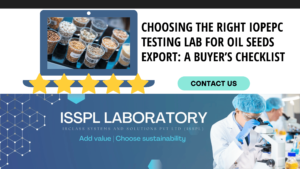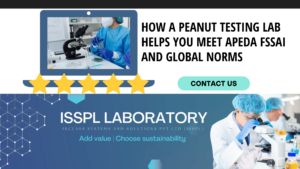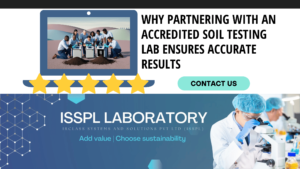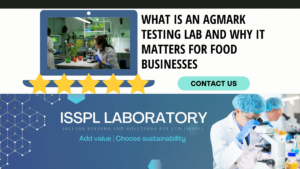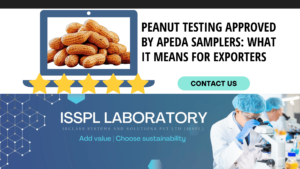An Overview by Team ISSPL - Analytical Testing Laboratory in India
ToggleFrom culinary traditions around the world, herbs, spices and condiments have always been an integral part of food, providing flavor, aroma and cultural significance. That, of course, means expanding global trade in these products and the challenges of ensuring the safety and quality of these products. Herbs and spices are accepted in international markets, and are subject to stringent global food safety standards, including contamination risks, adulteration and pesticide residues.
Testing is an essential part of ensuring that products meet these standards, are safe to consume and meet quality expectations of regulators, businesses and consumers. In this article we explain why herbs, spices and condiments should be tested, the main regulatory standards and the benefits to export.
Introduction
Herbs, spices and condiments are agricultural products that are susceptible to a number of safety hazards throughout cultivation, processing, storage and transport. Common issues include:
- Microbial Contamination: Salmonella and E.coli can be a serious health hazard.
- Adulteration: The process of combining inferior or harmful substances in order to increase weight or volume.
- Pesticide Residues: Pesticide residues are left over from excessive use in farming.
- Heavy Metals: Soil contamination or industrial pollution may raise lead, arsenic or cadmium.
These products must meet strict food safety standards, and consumers and regulators demand that they do so. If these requirements are not met, shipments may be rejected, products recalled and an exporter’s reputation damaged. Testing is rigorous and enables compliance, and enables trust in the quality and safety of products.
Key Regulatory Standards
While regional standards and regulations for global food safety differ, the aim remains the same: For the production of safe, high quality food products. Some of the most relevant standards for herbs, spices, and condiments include:
1. Codex Alimentarius
- It is an international food code set by the FAO and WHO which provides guidelines on the safety, quality and labeling of different food products.
- It sets maximum residue limits (MRLs) for pesticides and contaminants in herbs and spices.
2. European Union Standards
- The EU strictly regulates pesticide residues, heavy metals and microbiological contamination in food products.
- Maximum pesticide residue limits are regulated by regulations such as EC No. 396/2005.
3. United States FDA Standards
- Preventing contamination in food products is what the FDA enforces through the Food Safety Modernization Act (FSMA).
- It is closely monitored for microbiological safety, allergen labeling and residue levels.
4. FSSAI (India)
- The Food Safety and Standards Authority of India has requirements for herbs, spices and condiments under which limits are set for contaminants, pesticide residues and microbiological parameters.
5. ISO Standards
- Food safety management systems framework, ISO 22000 ensures the continuous production of safe food.
- The quality and the safety of saffron, a high value spice, is specifically addressed by ISO 3632.
- Exporters need to understand and comply with these regulatory standards, in order to be able to access international markets.

Role of Testing in Compliance
Testing herbs, spices and condiments to global food safety standards is all about testing. Potential hazards are found and compliance is confirmed by testing safeguards to protect both consumers and businesses.
1. Microbiological Testing
- It can detect harmful microorganisms, such as Salmonella, E. coli and mold, which cause food borne illness.
- Ensures that the product is safe to eat and that it complies with the regulatory microbiological limits.
2. Chemical Testing
- It tests for pesticide residues, heavy metals and other contaminants.
- It also ensures levels are within limits as set by regulatory bodies such as the EU and Codex Alimentarius.
3. Adulteration Detection
- It can detect adulteration — like mixing of cheaper substances (starch in turmeric or brick powder in chili).
- Product integrity and consumer confidence are provided.
4. Physical Testing
- It measures parameters like particle size, moisture content and ash content.
- It ensures the product meets quality specifications for use.
5. Allergen Testing
- It’s especially good in condiments for detecting allergens or cross contamination.
- It ensures correct labeling and compliance with regulations such as the FDA’s allergen labeling guidelines.
The methods of testing help manufacturers and exporters to be assured that their products comply with the international food safety standards and therefore protect consumers and improve the marketability of their products.
Benefits for Exporters
For exporters of herbs, spices, and condiments, rigorous testing provides several advantages that go beyond compliance:
1. Market Access
Only import is allowed after proof that the food safety standards of many countries are being complied with.
Testing guarantees that products are able to meet these requirements and easily enter lucrative markets like EU, US and the Middle East.
2. Reduced Risk of Rejection
- Rejected shipments, financial loss and damaged buyer relationships will follow.
- This risk is reduced by testing, which identifies issues before the product gets to its end point.
3. Enhanced Reputation
- A positive reputation with buyers and consumers is built when safe and high quality products are consistently provided.
- If you have a good reputation, the customer will come back to you or even work with you in long run.
4. Improved Product Quality
- Compliance is another reason why testing is needed, but it also helps manufacturers make better quality products by fine tuning their processes.
- The better the product, the more it is sold at a higher price in international markets.
5. Consumer Trust
- The food safety standards are verified to ensure that the products they buy are safe and authentic.
- With heightened food safety awareness in this age, this trust can translate to more sales.
Testing is a long term investment in the success of an exporter’s business as well as a means to maintain regulatory compliance, market competitiveness and consumer satisfaction.
Conclusion
The safety and quality of herbs, spices and condiments cannot be assumed and they are essential to global cuisine. To ensure that these products meet tough international food safety standards, protecting consumer health, and business from regulatory and reputational risk, it is vital to test these products comprehensively.
Testing, good quality, and key regulatory requirements are all thoroughly tested, and consistently good quality and adherence to key regulatory requirements allow exporters to enter new markets and build trust with buyers and consumers.
IRCLASS Systems and Solutions Pvt Ltd (ISSPL) is a leading provider of state of the art laboratory facilities and expertise with a proven track record in food safety analysis, providing reliable and advanced testing services. Through working with ISSPL, exporters are guaranteed that their products are complying with international standards so that they can compete in the ever competitive international market.
